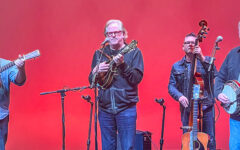
Band names can be a funny thing. Consequently, Canada’s Concession 23 naturally inspires some curiosity as to how their handle originated. Fortunately, vocalist and mandolin player, Kevin Golka, has a ready explanation.
“When we formed the band, we wanted it to be a true democracy,” he notes. “There would not be a single leader. Our goal, that we still keep to this day, is to concede to one another during playing. We feel that this brings out the best in each of us. So we wanted the concept of conceding to be in the name. The 23 comes from the number of strings in the band, from a guitar, banjo, bass, and mandolin.”
A traditional bluegrass band from Canada’s Ottawa Valley, Concession 23 met in a bluegrass music class in Ottawa, Ontario in the 1990s. The band was formed in 2003, and today it consists of Golka, Jonathan Ferrabee (bass and vocals), Sherry Philp (banjo and vocals), and Nick Strachan (guitar and vocals). Golka cites the Johnson Mountain Boys, Flatt and Scruggs, Del McCoury, Red Allen, Jimmy Martin, Claire Lynch, and Lynn Morris as the primary sources of their inspiration
The band’s bio describes them this way:
From the beginning, Concession 23 was a band made up of four very different but equal contributors. In the intervening 18 years, they have matured into one of Ontario’s most sought-after bluegrass bands with a voice uniquely their own. They embody the ideal that the sum is greater than the parts, and their success is founded on the collaboration underlying their music. Known for their considered arrangements, well-crafted stories, and tight integration, this band works as one.
In the process, Concession 23 has made it a point to share the nuances and styles that fall within the full expanse of bluegrass music’s traditional sound. Their approach ranges from lilting waltzes to driving grassers, while spanning contemporary motifs to rootsy backwoods designs. The band has toured throughout Ontario, Quebec, New Brunswick, and Prince Edward Island and they’ve also performed extensively at many major Canadian bluegrass festivals across Ontario, Quebec, and Eastern Canada.
“Concession 23 is one of Ontario’s most sought after bluegrass bands,” Golka says. “We’re widely known for our relaxed demeanor, and the obvious joy we exude when playing on stage.”
Golka also points out that Concession 23 has also become something of a fixture at the Central Canadian Bluegrass Awards. “Since our inception, we have garnered nominations in every available instrumental, vocal and recording category,” he says proudly. “Our first original recording, On the Mountainside, which appears on the 2006 album, North to Ontario, won Best Recording that year. In 2006 we were named Most Promising Band. Sherry Philp won Female Vocalist of the Year for five straight years, 2007 to 2011, and Banjo Player of the Year in 2012. Sherry’s unique voice is deeply rooted in the bluegrass tradition and the band is very proud of her accomplishments.”
In addition, the group’s music is routinely requested on radio programs across Canada, especially their original material. Golka notes that their most recent album, Walter and Alice, which was released in 2015, finished 66th on the international Roots Music Report chart for traditional bluegrass music.
The band’s sophomore set, The Walls Around You, was released in 2007 and drew its material from both modern and traditional sources in addition to four original recordings.
Concession 23’s next effort, 2009’s Wandering Steps, was nominated for Recording of the Year. They describe it as “a high-octane recording in the tradition of first generation bluegrass,” featuring songs written by Red Allen, Felice and Boudleaux Bryant, and Karl Davis and Harty Taylor, the pair who wrote for and inspired the Blue Sky Boys, the Everly Brothers, Buddy Holly, Roy Orbison, Bob Dylan, and others. The title track sets the theme; it’s about leaving home and then trying to find the way back. I Wasn’t Born in Carolina, co-written by Golka and Nick Strachan, gets more to the point – it’s a straight-ahead, up-tempo number about living and loving north of the 49th parallel.
While the band continue to write original songs, Golka says that the band also make it a point to cover seek material that hasn’t been over-exposed by others.
“We work hard not to be a cover band,” he insists. “Instead, we strive to make each song our own. Typically a band member will bring a song into the group, and together we craft an arrangement that does not focus on the original, or on other popular adaptations. It is important to us to bring something fresh and worthwhile to all songs in our repertoire.”
“When any one of us brings a new song to the band, we focus exclusively on the melody and the story,” Philp points out. “We avoid listening to other interpretations because we want an arrangement that uniquely and naturally flows from us.”
Asked to explain bluegrass music’s international popularity, Golka admits he doesn’t have an exact answer. “We don’t know,” he concedes. “It likely has something to do with the heartfelt stories and the melodic accessibility. Bluegrass reflects the experiences of everyday life, the events and emotions that make us human.”
We couldn’t agree more.







